Find Help
More Items From Ergsy search
-
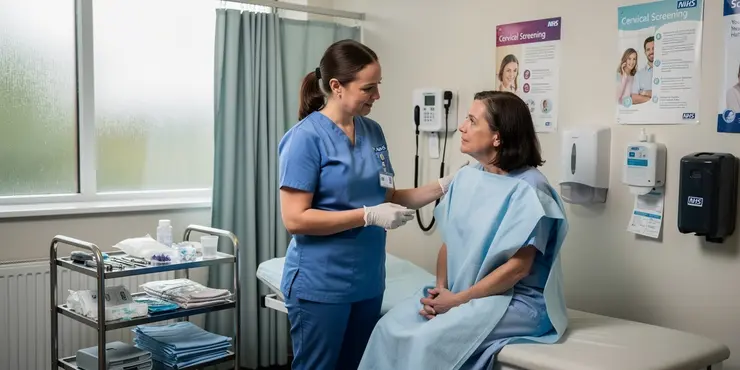
What is cervical screening (smear test)?
Relevance: 100%
-
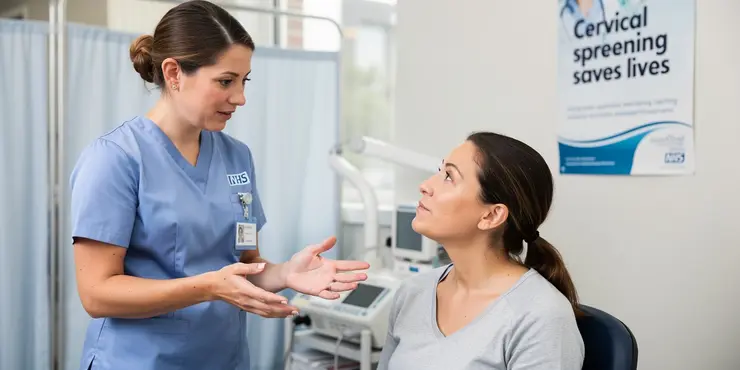
Cervical screening (smear test) – what’s it all about?
Relevance: 98%
-
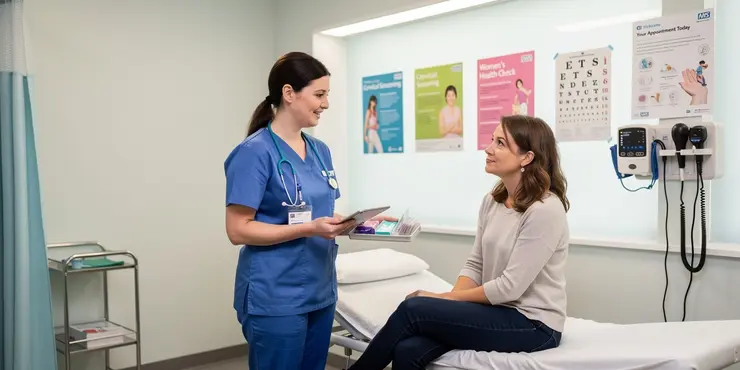
Booked in for your smear test (cervical screening) and not sure what to expect?
Relevance: 93%
-

Cervical screening: Q&A | NHS
Relevance: 74%
-

When should cervical cancer screening begin?
Relevance: 73%
-

The NHS is #StillHereToHelp with cervical screening
Relevance: 69%
-
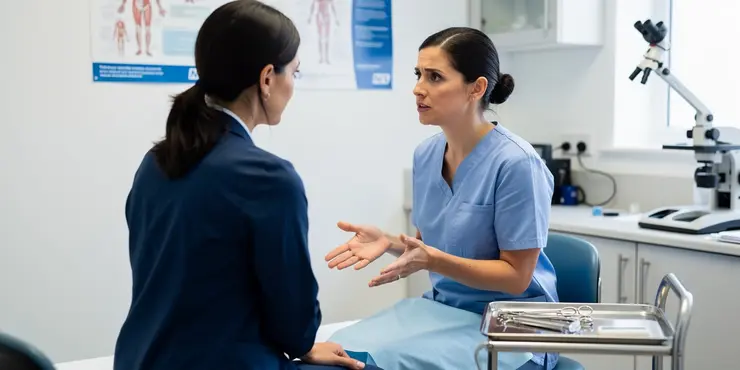
Cervical screening: what to expect | NHS
Relevance: 69%
-
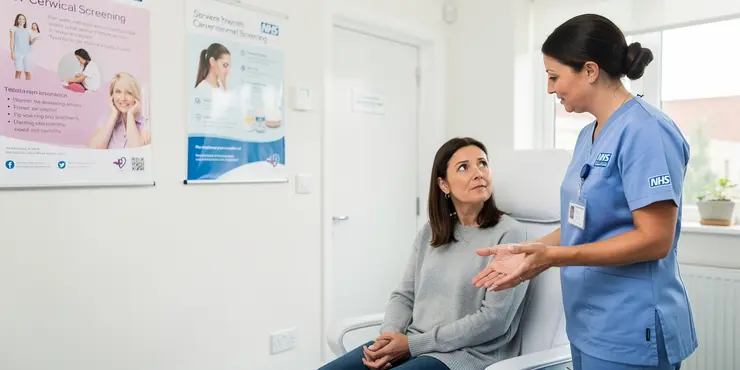
Cervical screening: how it's done | NHS
Relevance: 68%
-
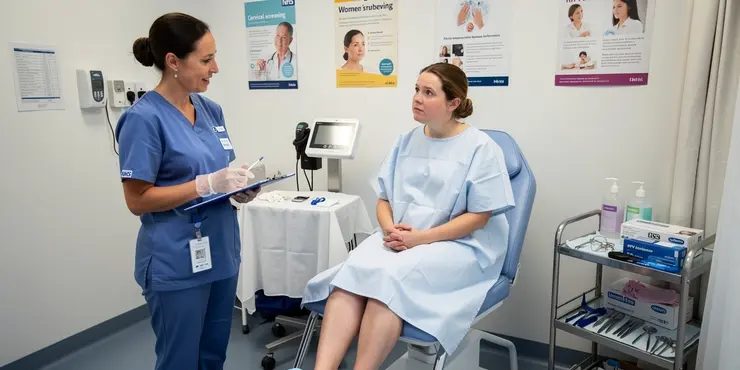
What is a Pap smear?
Relevance: 67%
-
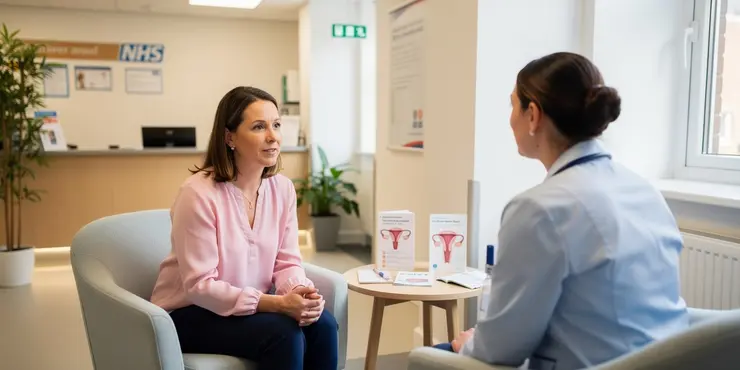
NHSGGC - Cervical Cancer Screening - English
Relevance: 65%
-
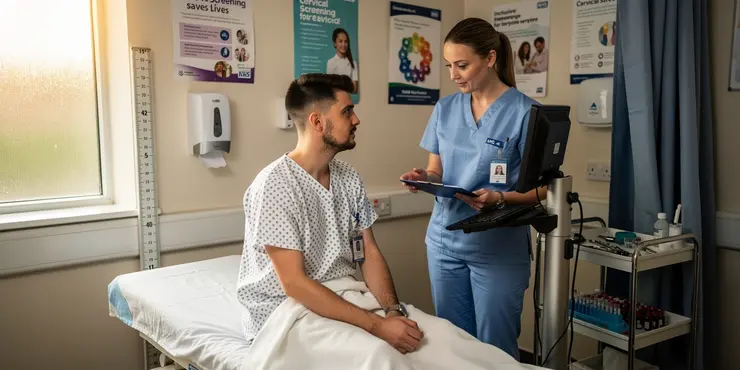
Cervical screening for transgender men | NHS
Relevance: 65%
-
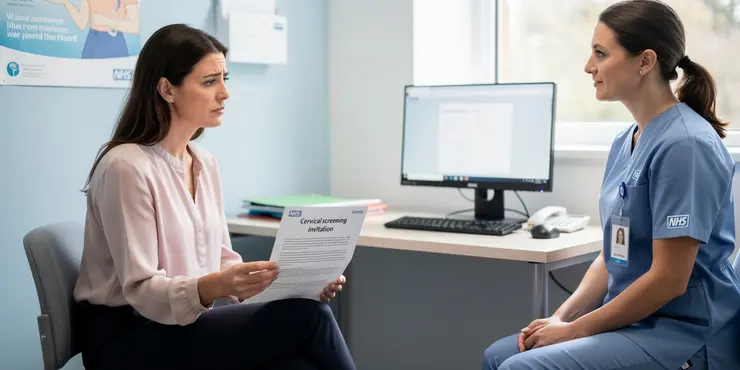
Don’t ignore your cervical screening invite | NHS
Relevance: 65%
-
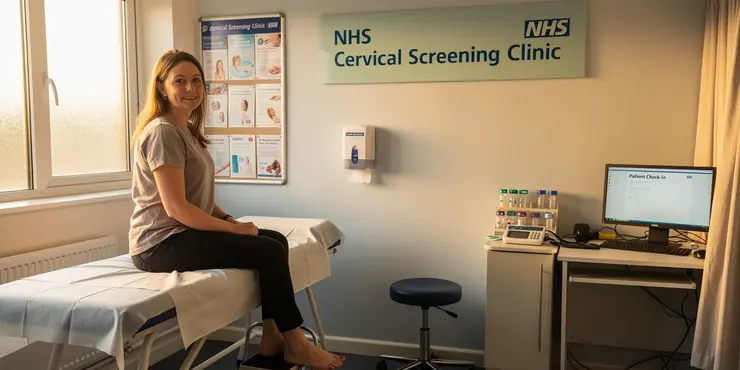
Cervical screening: what to expect | NHS
Relevance: 64%
-

Cervical screening for women who have experienced sexual assault | NHS
Relevance: 58%
-
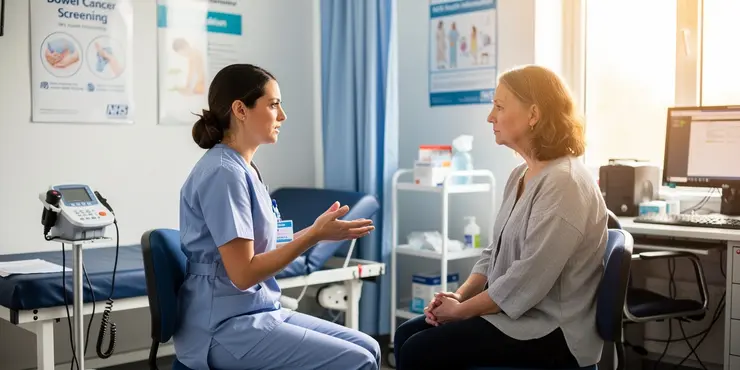
What kinds of cancer screening are available?
Relevance: 52%
-

Is HPV testing available?
Relevance: 51%
-
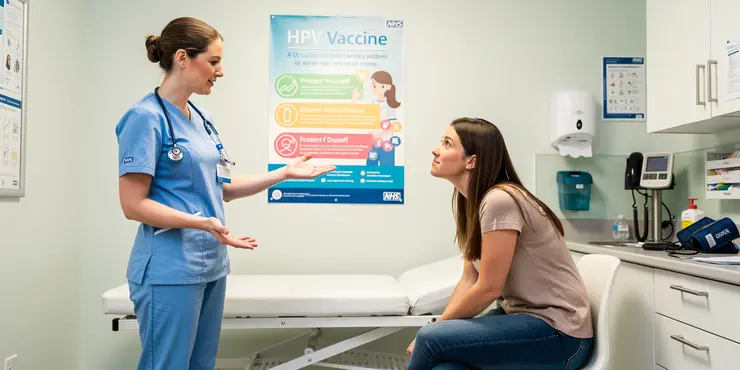
What is the link between HPV and cervical cancer?
Relevance: 51%
-
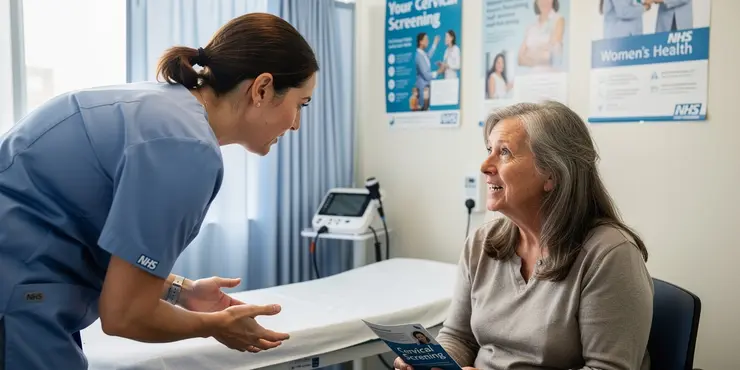
Accessing cervical screening with the right support for people with a learning disability
Relevance: 50%
-
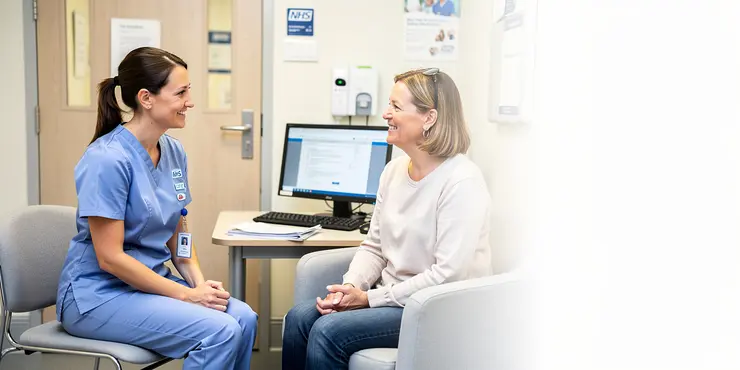
Health Screenings You Should Know About
Relevance: 48%
-
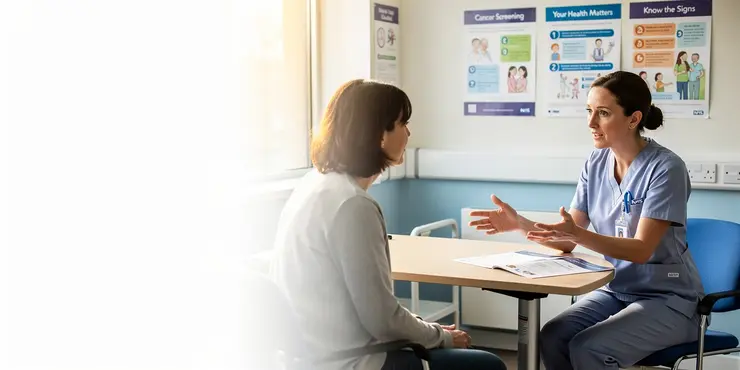
What is cancer screening?
Relevance: 47%
-
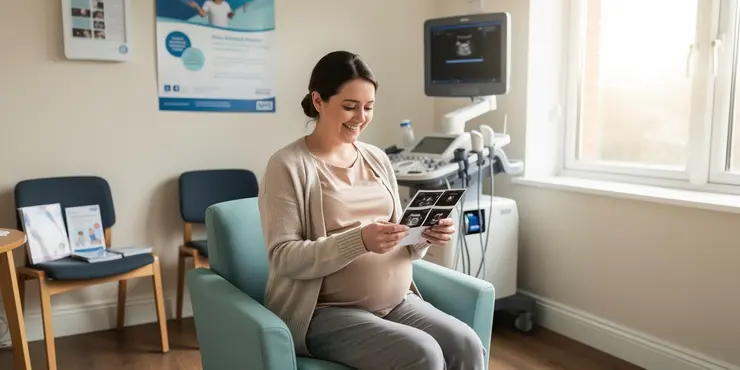
Screening tests for you and your baby | NHS
Relevance: 37%
-
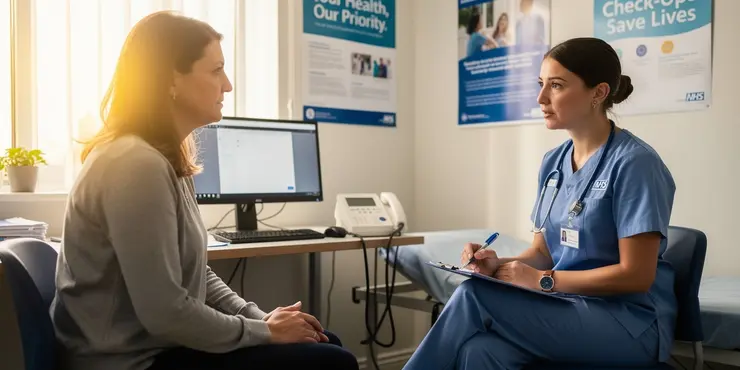
Can the test be performed during my menstrual period?
Relevance: 33%
-

HPV - My Story | NHS
Relevance: 33%
-

How to do the FIT bowel cancer screening test | Cancer Research UK
Relevance: 33%
-
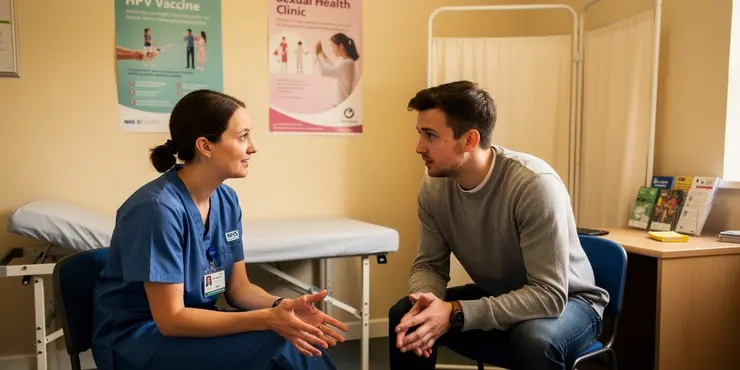
Can HPV lead to cancer?
Relevance: 33%
-
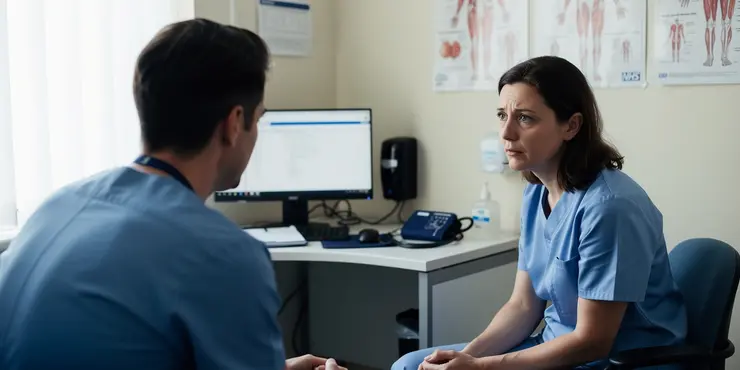
What steps should I take if a screening test shows abnormal results?
Relevance: 31%
-
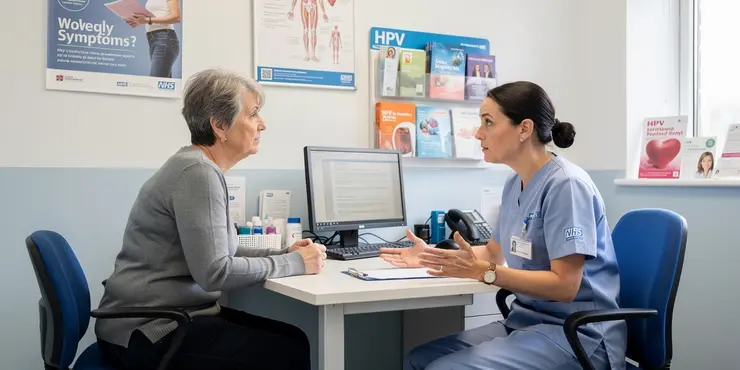
Are there symptoms of an HPV infection?
Relevance: 31%
-

How can HPV be prevented?
Relevance: 29%
-
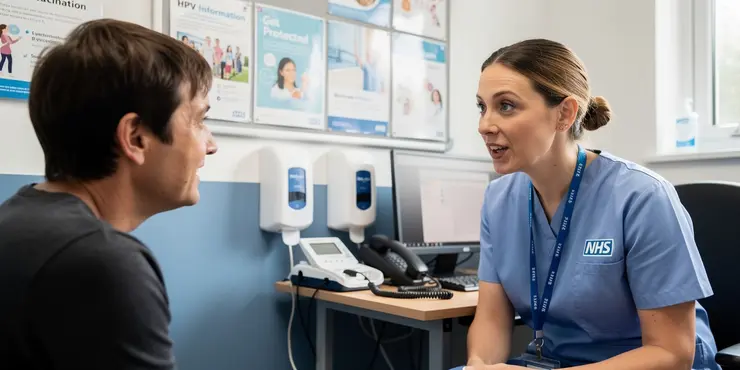
Can HPV be treated?
Relevance: 28%
-
Is screening painful or risky for my child?
Relevance: 28%
-
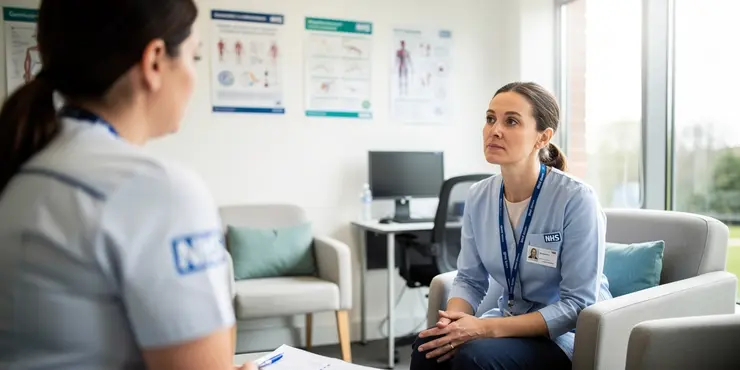
Is genetic screening available for cancer risk?
Relevance: 27%
-
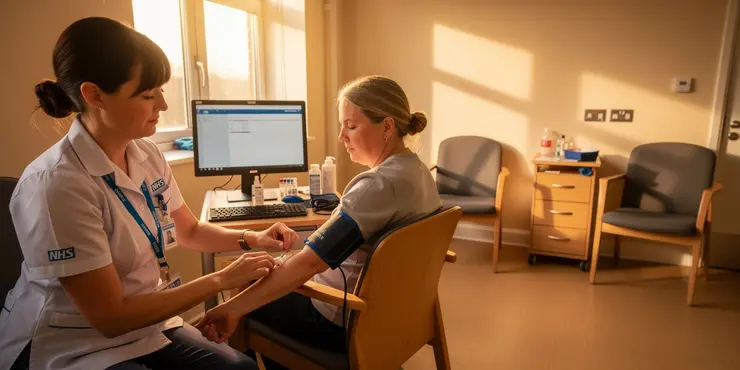
How is blood screened to prevent disease transmission?
Relevance: 27%
-
What happens if my child's screening results are positive?
Relevance: 27%
-

What are the recommendations for colorectal cancer screening?
Relevance: 27%
-
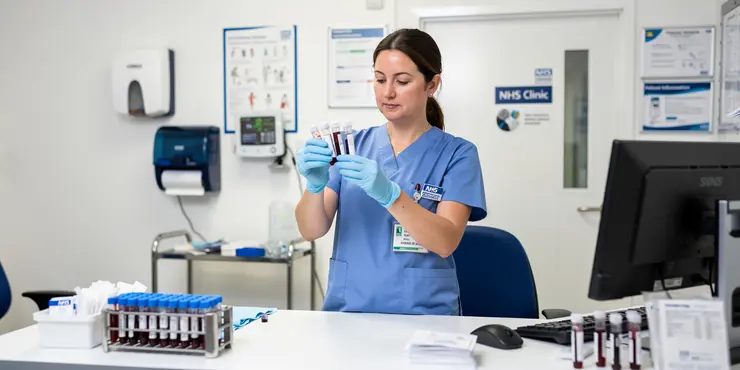
What other viruses are tested for in blood donations?
Relevance: 26%
-
What does screening for type 1 diabetes involve?
Relevance: 26%
-

Bowel cancer screening: Alan Titchmarsh and Tommy Walsh | NHS
Relevance: 26%
-
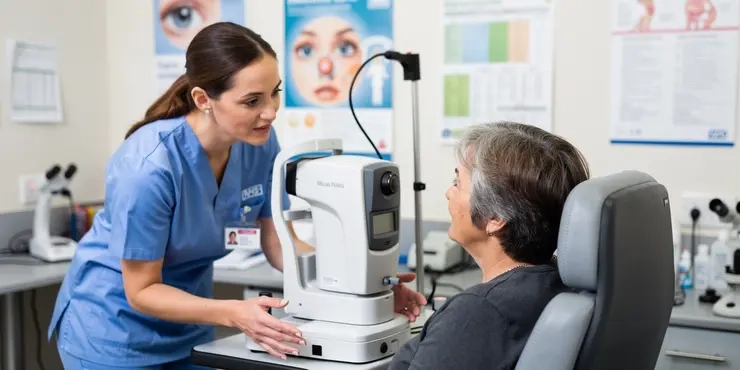
Diabetes Eye Screening
Relevance: 26%
-
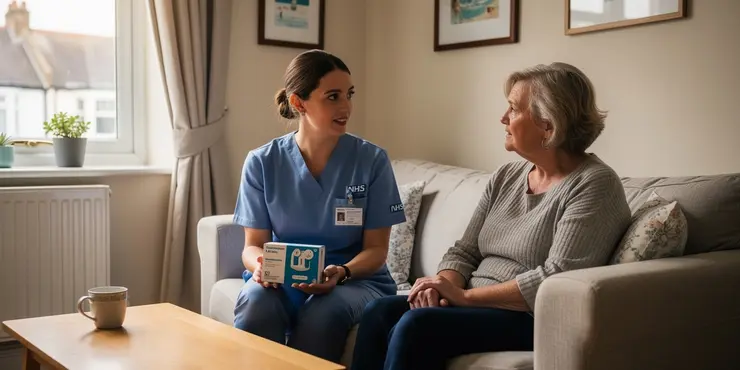
What are the advantages of an at-home colorectal cancer test?
Relevance: 26%
-
Should I screen my child for type 1 diabetes?
Relevance: 26%
Cervical Screening (Smear Test) – What’s It All About?
Introduction to Cervical Screening
Cervical screening, commonly referred to as a smear test, is a crucial health check for women in the UK. It aims to prevent cervical cancer by detecting early abnormalities in the cervix that could potentially develop into cancer. The test’s importance cannot be overstated, as it saves thousands of lives each year.
Who Should Have a Cervical Screening?
In the UK, cervical screening is routinely offered to women and people with a cervix aged 25 to 64. The screening intervals are as follows:
- Every 3 years for those aged 25 to 49.
- Every 5 years for those aged 50 to 64.
Those over 65 will only be invited if one of their last three tests was abnormal.
The Screening Process
During a cervical screening appointment, a small sample of cells is taken from the cervix using a soft brush. This procedure is usually quick and may cause some mild discomfort but should not be painful. The sample is then tested for high-risk types of human papillomavirus (HPV), which can cause cell changes in the cervix.
Understanding Your Results
Screening results typically arrive within 2 weeks. There are three main outcomes:
- Normal results: No changes have been found, and the next routine screening should be around three or five years later.
- Inadequate results: The sample was not conclusive, and you might need to repeat the test.
- Abnormal results: Cell changes have been found, often called dyskaryosis. This may require further testing or treatment to prevent the development of cervical cancer.
The Importance of Regular Screening
Regular cervical screening is crucial for early detection and prevention of cervical cancer. It helps to identify potentially harmful cells before they become cancerous, thus reducing the risk significantly. Even if vaccinated against HPV, continuing with regular screenings is essential as the vaccine does not protect against all types of HPV.
Addressing Common Concerns
Many women may feel anxious or embarrassed about the procedure. It’s important to remember that the test is performed by trained healthcare professionals who conduct these screenings routinely. If you have concerns, speak to your nurse or GP who can provide reassurance and answer any questions.
Conclusion
Cervical screening is a simple yet vital procedure that plays a significant role in safeguarding women's health. By attending your scheduled smear tests, you take an active step in the early detection and prevention of cervical cancer.
This HTML format provides an informative overview of cervical screening tailored for readers in the UK, covering essential aspects, processes, and the importance of the test.Cervical Screening (Smear Test) – What's It All About?
Introduction to Cervical Screening
Cervical screening, or a smear test, is an important health check for women in the UK. It helps find early signs that could lead to cervical cancer. This test is very important because it saves many lives every year.
Who Should Have a Cervical Screening?
In the UK, women and people with a cervix aged 25 to 64 should have cervical screening. Here is how often the screening is done:
- Every 3 years for people aged 25 to 49.
- Every 5 years for people aged 50 to 64.
If you are over 65, you will only need a test if one of your last three tests was not normal.
The Screening Process
During the cervical screening, a nurse or doctor will take a small sample of cells from your cervix with a soft brush. This is quick and might feel a bit uncomfortable, but it should not hurt. The sample is checked for HPV, a virus that can cause changes in the cervix.
Understanding Your Results
You will usually get your results in about 2 weeks. Here is what they can mean:
- Normal results: No changes found, and your next test will be in 3 or 5 years.
- Inadequate results: The sample wasn't clear, so you might need to take the test again.
- Abnormal results: Some changes were found, called dyskaryosis. You may need more tests or treatment to stop cancer from developing.
The Importance of Regular Screening
Regular cervical screening is very important. It helps find harmful cells early, before they turn into cancer. This lowers the risk a lot. Even if you had the HPV vaccine, you still need to go for screenings because the vaccine does not cover all HPV types.
Addressing Common Concerns
Some women might feel worried or shy about the test. Remember, trained healthcare professionals do the tests and they do many of them. If you feel worried, talk to your nurse or doctor. They can help you feel better and answer your questions.
Conclusion
Cervical screening is a simple but very important test. It helps keep women healthy by finding problems early. By going to your smear tests, you help stop cervical cancer before it starts.
This guide is for people in the UK. It gives key facts, explains how the screening works, and why it is important.
Frequently Asked Questions
What is a cervical screening (smear test)?
A cervical screening, also known as a smear test, is a procedure to detect abnormal cells in the cervix that could potentially develop into cervical cancer.
Who should get a cervical screening?
In the UK, women and people with a cervix aged 25 to 64 are invited for regular cervical screening. The frequency depends on age: every 3 years for those aged 25 to 49, and every 5 years for those aged 50 to 64.
How often should I get a cervical screening done?
Those aged 25 to 49 should have a smear test every 3 years, while those aged 50 to 64 are recommended to have one every 5 years.
What happens during the test?
During a cervical screening, a small sample of cells is taken from the cervix using a soft brush. The sample is then sent to a laboratory to be tested for human papillomavirus (HPV) and any abnormal cells.
Does the test hurt?
The test may cause some discomfort, but it should not be painful. Some people may feel slight pressure or a scratching sensation.
How should I prepare for a cervical screening?
It's best to schedule the test when you are not on your period. You should avoid using vaginal creams, lubricants, or medications for 24 hours before the test. You do not need to do anything else special to prepare.
What does an abnormal result mean?
An abnormal result means that changes in the cells of the cervix have been detected. Most abnormal results do not mean you have cervical cancer. You may need further tests or treatment to prevent cancer from developing.
What is HPV and why is it tested?
Human papillomavirus (HPV) is a common virus that can cause changes in the cells of the cervix. Testing for HPV can help identify individuals at higher risk of developing cervical cancer.
Can I have a cervical screening if I am pregnant?
Yes, you can have cervical screening if you are pregnant, but it may be delayed until after you have had your baby unless you are due for your test during early pregnancy or have had previous abnormal results.
What should I do if my result is abnormal?
If you have an abnormal result, your doctor will explain what the result means and recommend further tests or treatment if necessary. Common follow-up procedures include a colposcopy or a repeat smear test in a few months.
Is cervical screening only for women?
Cervical screening is for anyone with a cervix, including trans men and non-binary individuals who still have a cervix.
Can I refuse a cervical screening?
Yes, cervical screening is not mandatory. You have the right to refuse the test, although it is strongly recommended as a preventive measure against cervical cancer.
Is cervical screening free on the NHS?
Yes, cervical screening is free on the NHS in the UK.
How long does it take to get results from a cervical screening?
It typically takes about 2 weeks to receive the results of a cervical screening.
Where can I get a cervical screening?
You can get a cervical screening at your GP practice, sexual health clinics, or certain NHS walk-in centres.
What is a cervical screening (smear test)?
A cervical screening (smear test) checks your cervix. The cervix is inside a woman's body at the top of the vagina. Doctors use a special tool to do this test. It helps to keep you healthy.
If you find reading hard, you can ask someone to help you. You can also use pictures or videos to understand better.
A cervical screening is also called a smear test. It is a test to find any unusual cells in the cervix. These cells can sometimes turn into cervical cancer.
Who should have a cervical screening test?
In the UK, women and people with a cervix, ages 25 to 64, are asked to have a cervical screening check. How often you go depends on your age. You go every 3 years if you are 25 to 49 years old. You go every 5 years if you are 50 to 64 years old.
How often should I have a cervical screening test?
A cervical screening test checks your cervix to help keep you healthy.
Here is how often you should go:
- If you are 25 to 49 years old: Go every 3 years.
- If you are 50 to 64 years old: Go every 5 years.
Tips to help remember:
- Mark it on a calendar or set a reminder on your phone.
- Ask a friend or family member to remind you.
If you have any worries or questions, talk to your doctor or nurse. They can help you.
If you are between 25 and 49 years old, you should have a smear test every 3 years.
If you are between 50 and 64 years old, you should have a smear test every 5 years.
What happens during the test?
Here is what will happen when you take the test:
- First, you will get instructions. These are simple steps to follow.
- You might answer some questions or do some tasks.
- There may be a timer, but you can take your time.
- If you feel unsure, you can ask for help.
Tools that might help:
- A calculator, if you need to do math.
- A ruler for measuring.
- Someone to read things to you if you find reading hard.
Remember, the test is just to see what you know. It’s okay to try your best!
During a cervical screening, the doctor uses a soft brush to take a few cells from the cervix. These cells are then sent to a lab to be checked for HPV (a virus) and any cells that don't look normal.
Does the test hurt?
The test might feel a little bit uncomfortable. But it should not hurt a lot.
If you are scared, you can tell a person you trust. They can help you feel better.
You can take deep breaths. Breathing slowly can help you relax.
The test might not feel nice, but it should not hurt. Some people might feel a little pressure or a tickling feeling.
How can I get ready for a cervical screening?
Cervical screening is a simple test to check the health of your cervix. Here are some tips to help you get ready:
- Try to book your test for a time when you're not on your period.
- Wear comfortable clothes that are easy to take off and put on.
- Relax and take deep breaths if you feel nervous.
- Bring a friend with you if it helps you feel better.
- Ask the nurse any questions you have before the test starts.
Remember, cervical screening is important for your health.
It's a good idea to have the test when you are not on your period. Do not use any vaginal creams, lubricants, or medicines for one day before the test. You don't need to do anything else to get ready.
Here are some tips to help you remember:
- Mark your calendar when you have your period, so you know when to schedule the test.
- Set a reminder on your phone or write a note to avoid using creams or lubricants the day before the test.
What does an abnormal result mean?
Sometimes test results show something different from what is normal. This is called an "abnormal result."
An abnormal result doesn't always mean something bad. It just means the doctor needs to check more.
The doctor might do more tests or talk with you about how you are feeling.
If you find reading hard, you can ask for help from someone like a family member, friend, or healthcare professional. They can explain things to you.
You can use a computer or phone to read text out loud. This can make it easier to understand.
An abnormal result means there are changes in the cells of your cervix. This does not usually mean you have cervical cancer. But you might need more tests or treatment to stop cancer from starting.
What is HPV and why do we test for it?
HPV is a kind of germ that can make you sick. Some kinds of HPV can cause lumps called warts. Other kinds can lead to cancer.
We test for HPV to see if someone has the germ. If we find HPV early, doctors can help stop it from causing problems like cancer.
It's important to have tests when the doctor says. This helps keep us healthy.
You can ask your doctor if you have questions. They can also help you understand more.
HPV is a virus. A lot of people catch it. It can make cells in the cervix change. Doctors can test for HPV. This test helps find people who might get cervical cancer.
If reading is hard, try using tools like text-to-speech apps. These apps read the words out loud. You can also use a finger or a ruler to help you follow the text. Breaking information into smaller parts can make it easier to understand.
Can I have a cervical screening if I am pregnant?
If you are pregnant, you might want to know if you can have a cervical screening test. A cervical screening checks your cervix for any changes. It helps keep you healthy.
If you are pregnant, it is good to talk to a doctor or nurse. They will tell you the best time for your screening. Sometimes, it is better to wait until after the baby is born. The doctor or nurse can explain what is best for you.
If you need help to understand more about this, ask someone you trust. You can also use tools like pictures or videos that explain things in a simple way. Talking to a healthcare professional can also help you feel comfortable.
Yes, you can have a cervical screening if you are pregnant. But it might be better to wait until after your baby is born. If your screening is due early in your pregnancy or you have had unusual test results before, you should still have it.
Here are some tips to help you understand:
- Ask Questions: If you do not understand, ask your doctor or nurse to explain it simply.
- Use Tools: Use pictures or videos about cervical screening to help you learn.
- Get Support: Bring a friend or family member with you to help you remember the information.
What should I do if my result is not normal?
If your test result is not what you expected, here are some easy steps to follow:
- Stay calm and don’t worry too much. It’s okay to have questions.
- Talk to your doctor or nurse. They can help you understand the result.
- Ask a friend or family member to go with you for support.
- Write down any questions you have, so you don’t forget them.
- Use pictures or drawings to help you understand better.
- Ask for more information if anything is confusing.
If your test result is not normal, the doctor will tell you what it means. They might say you need more tests or special care. You might need to go for a closer look called a colposcopy, or do another test in a few months.
Is cervical screening only for women?
Cervical screening is a health test. It checks for problems in the cervix. The cervix is a part of the body inside women. But this test is not just for people who say they are women.
Some people who were born female might not call themselves women now. But they still need this screening.
Remember:
- If you were born with a cervix, you need the test.
- It helps keep you healthy.
- Talk to a doctor if you are unsure.
Tools to help:
- Use pictures to understand better.
- Ask a trusted person to help explain.
- Finding videos that show what happens can be helpful.
Cervical screening is for anyone who has a cervix. This includes some trans men and non-binary people.
Can I say no to a cervical screening?
Yes, you can say no to a cervical screening test. It's your choice. If you are unsure, talk to your doctor or nurse. They can help you understand it better.
Here are some tips to help you decide:
- Ask questions if you do not understand.
- Take someone you trust with you to the appointment.
- Use pictures or videos to learn more.
- Write down what you want to ask before you go.
Yes, you do not have to have a cervical screening test. You can say no to the test if you want. But, we suggest it because it can help stop cervical cancer.
Can you get a cervical screening for free with the NHS?
Yes, getting a cervical screening test is free on the NHS in the UK.
How long do I wait to get my cervical screening results?
After your cervical screening, you might wonder how long it will take to get your results.
Most people get their results in a few weeks.
If you have questions, you can ask someone you trust, like a family member, friend, or your healthcare provider.
You can also use a calendar or a reminder app to help you keep track of when to expect your results.
It usually takes about 2 weeks to get the results from a cervical screening test.
Where can I get a cervical screening?
You can get a cervical screening test at a doctor’s office or a health clinic.
Here is how you can make it easy and comfortable:
- Ask a friend or family member to go with you.
- Write down any questions you have before you go.
- Tell the doctor or nurse if you feel scared or nervous. They can help you feel better.
- Use a calendar or phone reminder so you don’t forget your appointment.
These tips can help make your visit easier. If you need more help, you can ask someone you trust or call the clinic for advice.
You can have a cervical screening at your doctor’s office, sexual health clinics, or some NHS walk-in centres.
Useful Links
This website offers general information and is not a substitute for professional advice.
Always seek guidance from qualified professionals.
If you have any medical concerns or need urgent help, contact a healthcare professional or emergency services immediately.
Some of this content was generated with AI assistance. We’ve done our best to keep it accurate, helpful, and human-friendly.
- Ergsy carfully checks the information in the videos we provide here.
- Videos shown by Youtube after a video has completed, have NOT been reviewed by ERGSY.
- To view, click the arrow in centre of video.
- Most of the videos you find here will have subtitles and/or closed captions available.
- You may need to turn these on, and choose your preferred language.
- Go to the video you'd like to watch.
- If closed captions (CC) are available, settings will be visible on the bottom right of the video player.
- To turn on Captions, click settings .
- To turn off Captions, click settings again.
More Items From Ergsy search
-

What is cervical screening (smear test)?
Relevance: 100%
-

Cervical screening (smear test) – what’s it all about?
Relevance: 98%
-

Booked in for your smear test (cervical screening) and not sure what to expect?
Relevance: 93%
-

Cervical screening: Q&A | NHS
Relevance: 74%
-

When should cervical cancer screening begin?
Relevance: 73%
-

The NHS is #StillHereToHelp with cervical screening
Relevance: 69%
-

Cervical screening: what to expect | NHS
Relevance: 69%
-

Cervical screening: how it's done | NHS
Relevance: 68%
-

What is a Pap smear?
Relevance: 67%
-

NHSGGC - Cervical Cancer Screening - English
Relevance: 65%
-

Cervical screening for transgender men | NHS
Relevance: 65%
-

Don’t ignore your cervical screening invite | NHS
Relevance: 65%
-

Cervical screening: what to expect | NHS
Relevance: 64%
-

Cervical screening for women who have experienced sexual assault | NHS
Relevance: 58%
-

What kinds of cancer screening are available?
Relevance: 52%
-

Is HPV testing available?
Relevance: 51%
-

What is the link between HPV and cervical cancer?
Relevance: 51%
-

Accessing cervical screening with the right support for people with a learning disability
Relevance: 50%
-

Health Screenings You Should Know About
Relevance: 48%
-

What is cancer screening?
Relevance: 47%
-

Screening tests for you and your baby | NHS
Relevance: 37%
-

Can the test be performed during my menstrual period?
Relevance: 33%
-

HPV - My Story | NHS
Relevance: 33%
-

How to do the FIT bowel cancer screening test | Cancer Research UK
Relevance: 33%
-

Can HPV lead to cancer?
Relevance: 33%
-

What steps should I take if a screening test shows abnormal results?
Relevance: 31%
-

Are there symptoms of an HPV infection?
Relevance: 31%
-

How can HPV be prevented?
Relevance: 29%
-

Can HPV be treated?
Relevance: 28%
-
Is screening painful or risky for my child?
Relevance: 28%
-

Is genetic screening available for cancer risk?
Relevance: 27%
-

How is blood screened to prevent disease transmission?
Relevance: 27%
-
What happens if my child's screening results are positive?
Relevance: 27%
-

What are the recommendations for colorectal cancer screening?
Relevance: 27%
-

What other viruses are tested for in blood donations?
Relevance: 26%
-
What does screening for type 1 diabetes involve?
Relevance: 26%
-

Bowel cancer screening: Alan Titchmarsh and Tommy Walsh | NHS
Relevance: 26%
-

Diabetes Eye Screening
Relevance: 26%
-

What are the advantages of an at-home colorectal cancer test?
Relevance: 26%
-
Should I screen my child for type 1 diabetes?
Relevance: 26%


